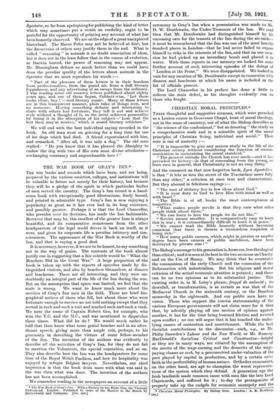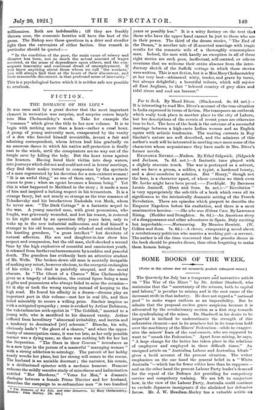CHRISTIAN MORAL PRINCIPLES.*
THESE thoughtful and suggestive sermons, which were preached as a Lenten course in Grosvenor Chapel, treat of moral theology, not in the sense of casuistry, nor of what the Bishop describes as
"the science of the confessional," but as denoting "the study on a comprehensive scale and in a scientific spirit of the moral principles of Christian living, individual and social." Their note is one of austerity :— "it is impossible *to give any serious study to tho life of the Christian society without considering the function of excom- munication in maintaining the moral standard." "Time greatest mistake the Church has ever made—and it has pervaded its history—is that of concealing from the young, or from men in general, that Christianity is not an easy thing."
And the comment on that now forgotten book, Lyra Apo8tolic7, is that "it lets us into the secret of the Tractarians more fully than any other," a criticism at once true and characteristic. But they abound in felicitous sayings :— " The root of idolatry lies in low ideas about Cod." "it is your duty to God to love Him with mind as well as with heart."
"The Bible is of all books the most contemptuous of majorities." "What makes people servile is that they care what other people think about them." "We can learn to love the people we do not like." "Service means sacrifice, it is comparatively easy to learn this in war ; it is extraordinarily difficult to learn it in peace."
"We cannot read the Biblo honestly without becoming conscious that there is therein a tremendous suspicion of being rich." "How many public careers, which might in greater or smaller degree have been careers of public usefulness, have been destroyed by private sins ! "
The Bishop's message to his generation is, however, less theological than ethical; and it is seen at its best in the two sermons on Charity and on the Use of Money. We may think that he overstates the communism of the early Church and the connexion of the Reformation with industrialism. But his religious and moral criticism of the actual economic situation is pointed ; and there can be no two opinions as to its substantial justice. This existing order is, in M. Loisy's phrase, frappe de caducite ; its downfall, or transformation, is as certain as was that of the Mediaeval Church in the sixteenth century, or the Bourbon monarchy in the eighteenth. And our public men have no vision. Those who support the interim statesmanship of the various European governments will not claim more for it than that, by adroitly playing off one section of opinion against another, it has for the time being lessened friction and averted open conflict ; no one will argue that it has touched the under- lying causes of contention and unsettlement. While the best Socialist contributions to the discussion—such, e.g., as Mr. Philip Snowden's Labour and the New World, or Mr. Ramsay MacDonald's Socialism Critical and Constructive—helpful as they are in many ways, are vitiated by the assumption of the merits of the wage-earning and the demerits of the wage- paying classes as suck by a preconceived under-valuation of the part played by capital in production, and by a certain naive faith in the perfectibility of human nature. Orthodox economists, on the other hand, are apt to champion the worst representa- tives of the system which they defend. A generation ago the Irish landlords made common cause with men like the late Lord Clanricarde, and suffered for it ; to-day the protagonists of property take up the cudgels for economic monopoly and the
• Chridian Moral Principles. By 'Bebop Gore. London: A. B. Mcwbray.
millionaires. Both are indefensible ; till they are frankly thrown over, the economic heretics will have the best of the game. The Bishop sees these questions in a drier and steadier light than the extremists of either faction. One remark in particular should be quoted :—
"In the condition of the poor, the main cause of misery and disaster has been, not so much the actual amount of wages received, as the sense of dependence upon others, and the con- sequent insecurity and continual dread of unemployment. If you know anything about those whom we call 'the workers,' you will always find that at the heart of their discontent, and their reasonable discontent, is that profound sense of insecurity."
This is a psychological factor which it is neither safe nor possible to overlook.



































 Previous page
Previous page